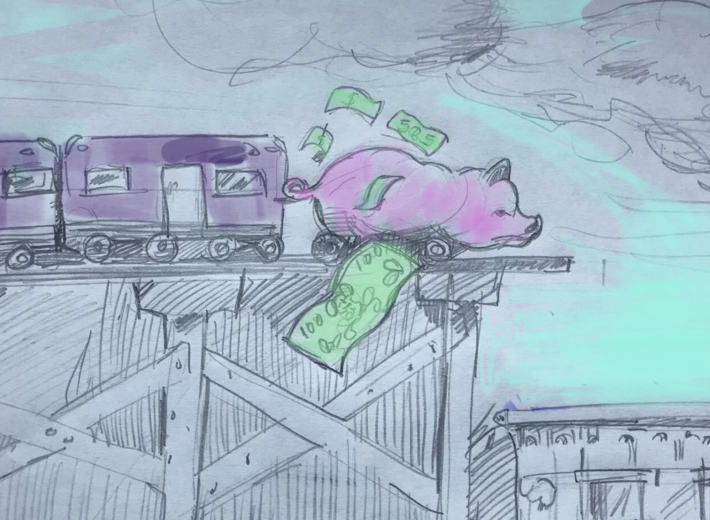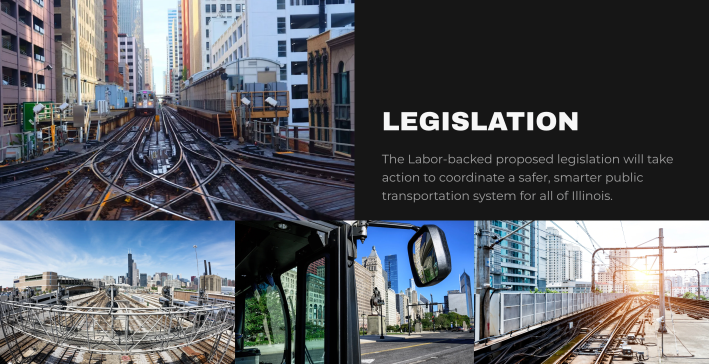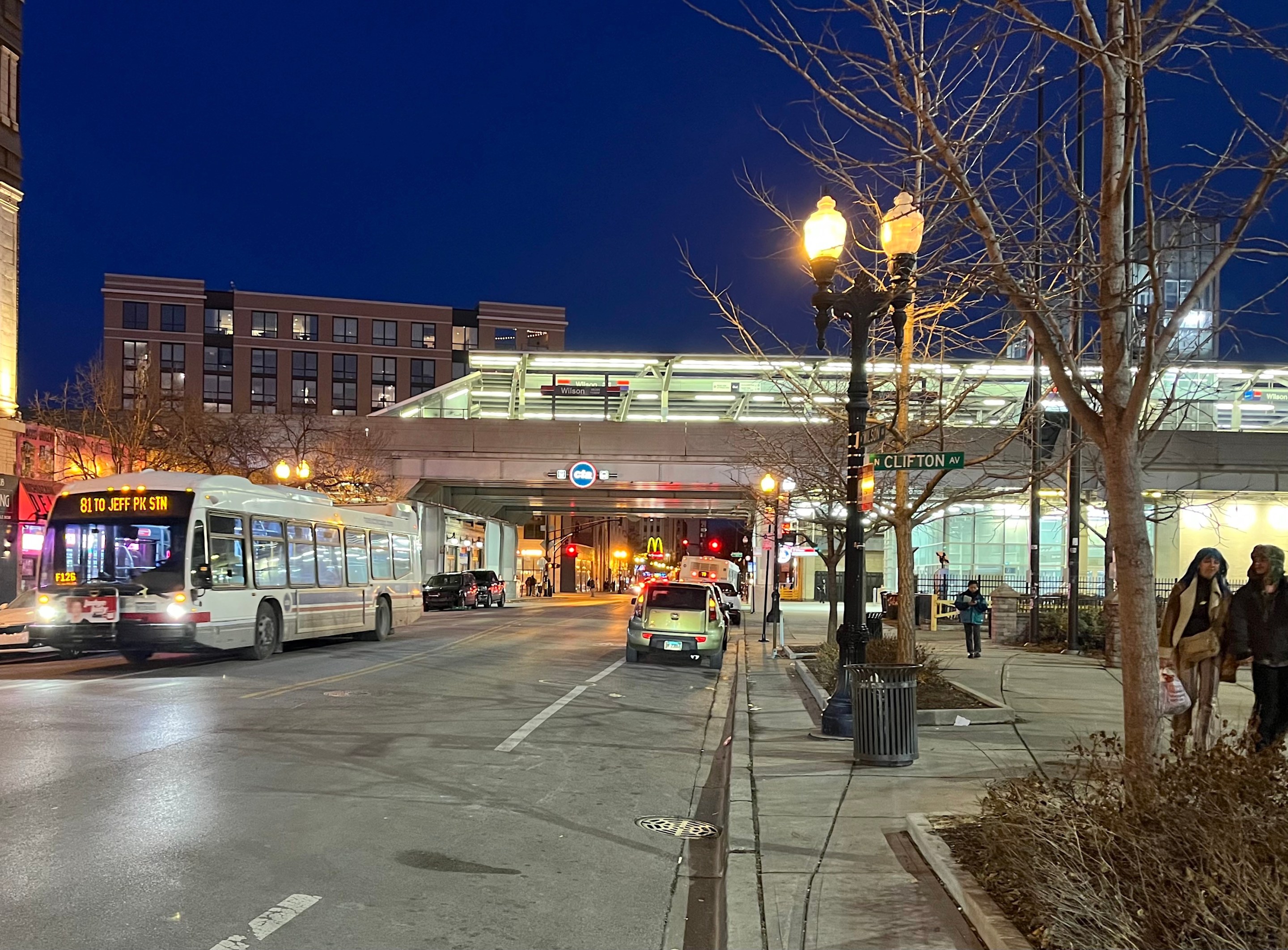
By now, the Chicago region's looming $770 million total budget chasm for the CTA, Metra, and Pace in 2026 is more than just a phantom menace. As Streetsblog has discussed at length, federal pandemic subsidy cash is projected to run out next year. According to the Regional Transportation Authority, which oversees the three transit agencies, if we don't address the problem this spring, the result will be service cuts, fare hikes, and ridership loss, i.e., a "transit death spiral."
In the past week, Streetsblog published interviews with two of the key legislators in Springfield trying to address the issue, State Rep. Kam Buckner (D-26th), and llinois transportation committee chair State Sen. Ram Villivalam (D-8th). They've both supported the Metropolitan Mobility Authority Act, which would consolidate the four agencies into one. That could help better coordinate service and cut costs, as well as calling for $1.5 billion in additional state transit funds. "No funding without reform" has been their slogan.
On Thursday, there were more signs that a force is awakening to tackle the problem. The Chicago Sun-Times and WTTW reported on a new bill sponsored by Sen. Villivalam and backed by an alliance of labor unions, called "United We Move". Tim Drea, president of the Illinois AFL-CIO, and Bob Reiter, president of the Chicago Federation of Labor, published an op-ed about the proposal in Crain's Chicago.
Interestingly, while the legislation would give the RTA more power over the three public transportation systems, it would not merge the agencies. Here's a quick rundown of what's proposed. We'll try to provide reactions from sustainable transportation advocacy organizations in the near future.
"In Springfield, the stakes could not be higher as state legislators consider how they will step up to prevent a true calamity," Drea and Reiter stated in their opinion piece. "Without help, the trains and buses that shuttle us where we need to go face devastating service cuts that will cripple the region. We cannot and will not let that happen."

Drea and Reiter say 30 labor organizations have joined forces in the Labor Alliance for Public Transportation, representing thousands of transit workers. They're proposing Senate Bill 1938, with an emphasis on "ridership safety," introduced by Sen. Villivalam and Assistant House Majority Leader Marcus Evans (D-102nd). The legislation has these planks (their language).
• "Creating a new era of coordination among the service agencies to help riders reach their destinations faster, including universal fare tools that have been used successfully in other states and counties."
• "Establishing stronger safety measures among Metra, Pace and the CTA to ensure riders get to where they need to go with extra peace of mind."
• "Making common-sense changes to the boards governing how transit services are provided and providing new accountability measures for performance, rather than risking inadequate oversight of one consolidated board, as others have suggested."
• "Raising the qualification standards of service board members to bring much-needed industry expertise to those guiding the administrative decisions of each system."
Particularly interesting is the last one, the idea of requiring transit board members to have some kind of transit or urban planning expertise. That issue has reared its head in Chicago recently as Mayor Brandon Johnson appointed two different West Side clergymen with little or no transit experience for the CTA and RTA boards, respectively.
Drea and Reiter noted that discussion of the bill in the spring legislative session will include plenty of talk about Chicagoland. But they said that public transportation reform can .potentially benefit all Illinois cities, "from Waukegan to Cairo and Quincy to Danville"
"Now is our best chance to turn this moment of uncertainty and concern into hope," the labor leaders conclude. "[United We Move] is a plan for the 21st century and provides us with a blueprint for efficiency that will get us to and from our destinations with the ease and speed we all deserve."
According to the Sun-Times report, the bill would empower the RTA to withhold about 10 percent of operational funds from systems that don't follow through with reforms. They'd be required to file quarterly reports and make sure board members are properly qualified to make decisions about transit.
The legislation also recommends creating an RTA police force, in addition to the existing Metra Police Department, which would keep tabs on "transit property, vehicles, and stations along all routes," the Sun-Times reported.
According to the Sun-Times, the transit coalition also calls for creating a transit ambassadors program, something that has never gotten off the the ground in Chicago before.
Like the RTA’s “Transforming Transit” initiative that the agency's board chair Kirk Dillard discussed at a City Club of Chicago event last month, United We Move calls for standardizing CTA, Metra, and Pace fares. Metra and Pace appear to be in favor of this, as long as they don't get absorbed into a single Chicagoland transit agency. Dillard also called for the $1.5 billion in additional transit funding and 10 percent fare hikes.

In addition, the Labor Alliance for Public Transportation called for lowering Illinois' 50 percent farebox recovery ration, which requires half of operating expenses to be paid for through fares, and other revenue sources like advertising, the Sun-Times reports.
It is notable that last spring Sen. Villivalam sponsored a bill calling for consolidating the four agencies, but now he's backing this legislation that would avoid the merger. (The bill, known as Metropolitan Mobility Authority, would also establish new options to change land use around transit service.)
"Alongside the 15,000 union members that deliver public transit services through CTA, Metra and Pace, I am committed to ensuring that working- and middle-class families have an integrated public transit system that connects them to economic opportunities, services and each other for decades to come," the senator said in a statement on the United We Move website.
My advice to the elected officials who say they want to save the Chicagoland transit network from the imminent disaster? Do or do not. There is no try.
Update, 2/10/25, 12:40 PM: Asked for the Active Transportation Alliance's perspective on the "United We Move" proposal, ATA spokesperson Ted Villaire noted that the advocacy group is part of the Illinois Clean Jobs Coalition. He provided the coalition's response to the proposed legislation:
"The hard-working Illinoisans who operate and maintain Northeastern Illinois’ transit systems are essential to day-to-day reliability and operation, and we’re thrilled to see them joining the conversation about our system’s future. We appreciate the work the Labor Alliance for Public Transit put into this thoughtful proposal and look forward to continuing the conversation to ensure Illinois’ transit system coordinates smooth, accessible and equitable service, connects folks to affordable active modes of transportation, and mitigates air and climate pollution."
Read the Sun-Times article here.
Check out the United We Move website here.

Did you appreciate this post? Streetsblog Chicago is currently fundraising to help cover our 2025-26 budget. If you appreciate our reporting and advocacy on local sustainable transportation issues, please consider making a tax-deductible donation here. Thank you!





